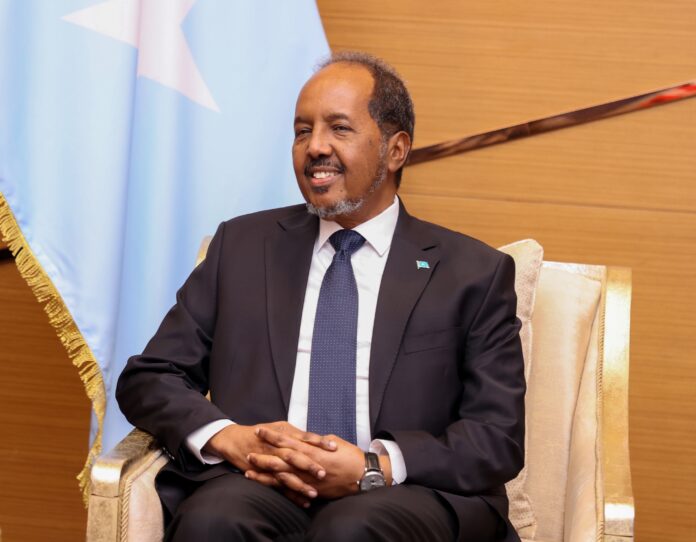GAROWE, Somalia – Somalia’s semi-autonomous Puntland region has claimed that international partners are increasingly withdrawing trust from the federal government in Mogadishu, even as the United States and United Kingdom expand direct cooperation with Puntland’s counterterrorism forces.
Puntland Information Minister Mahamud Cadiid Dirir said global stakeholders have grown frustrated with the federal leadership under President Hassan Sheikh Mohamud.
“The international community is disappointed,” Dirir told local media. “They say, ‘We’ve lost faith in Hassan Sheikh. We’re pulling away. Intelligence can no longer be trusted with Villa Somalia.’”
Dirir offered no documentation to support his claims, but his remarks reflect a deepening political rift between Puntland and the federal government, exacerbated by longstanding disagreements over constitutional authority and security coordination.
Dirir pointed to a recent US military airdrop in the Golis Mountains as evidence of Western powers turning to Puntland as a more reliable partner in the fight against terrorism.
“You saw the other day — US aircraft dropped supplies to our troops at the highest mountain posts,” he said, referring to operations in northeastern Bari region, where Puntland forces have been battling an entrenched Islamic State faction.
US Africa Command (AFRICOM) confirmed that its forces had recently provided logistical support to Somali partner units, though it did not specify whether those units were aligned with the federal or regional government.
Since late 2024, Puntland has led “Operation Hilaac,” a sustained offensive targeting ISIS-Somalia militants entrenched in the Cal Miskaad mountain range. The US has backed the effort with intelligence, logistics, and precision airstrikes.
Analysts estimate that ISIS-Somalia’s operational capacity has weakened over the past year, with the group now limited to fewer than 1,000 fighters. Recent operations have included coordinated raids, weapons seizures, and disruption of local financing networks.
Dirir said international stakeholders, including the US and UK, now view Puntland as “a trusted ally” in the global fight against terrorism.
Federal government still in the picture
Despite Puntland’s claims, AFRICOM has repeatedly emphasized that its operations in Somalia are conducted “in coordination with the Federal Government of Somalia.” In April and again in June, US airstrikes targeting ISIS militants were publicly attributed to joint planning with federal officials.
Additionally, Somalia’s federal government has continued to receive support through various Western-backed programs, including military training, counterterrorism funding, and intelligence-sharing arrangements.
While tensions with Puntland have escalated—particularly since the region suspended recognition of Mogadishu’s authority in early 2024—Western officials have not formally withdrawn support from the federal government.
Puntland’s narrative appears aimed at reinforcing its image as a stable, reliable security partner amid growing national fragmentation. The region has long accused Mogadishu of overreach and mismanagement, particularly in matters of defense and resource sharing.
“Puntland is positioning itself as the preferred partner of Western allies,” said Mohamed Mubarak, a Somali security analyst based in Nairobi. “But the West is still walking a tightrope, trying to balance relations with both the federal and regional governments.”
As Somalia grapples with internal political rifts and persistent extremist threats, Puntland is seeking to capitalize on its military performance to gain international favor. While its leaders argue that Mogadishu has lost global trust, the facts on the ground suggest a more complex picture—one where international partners are working with both federal and regional actors in parallel.



